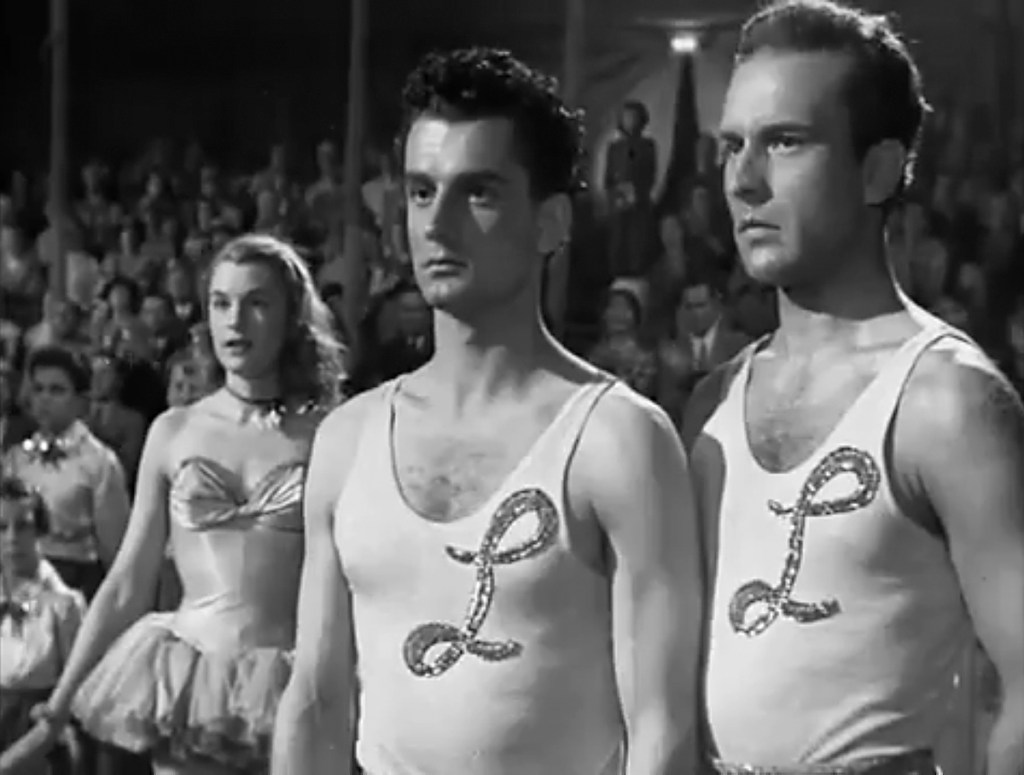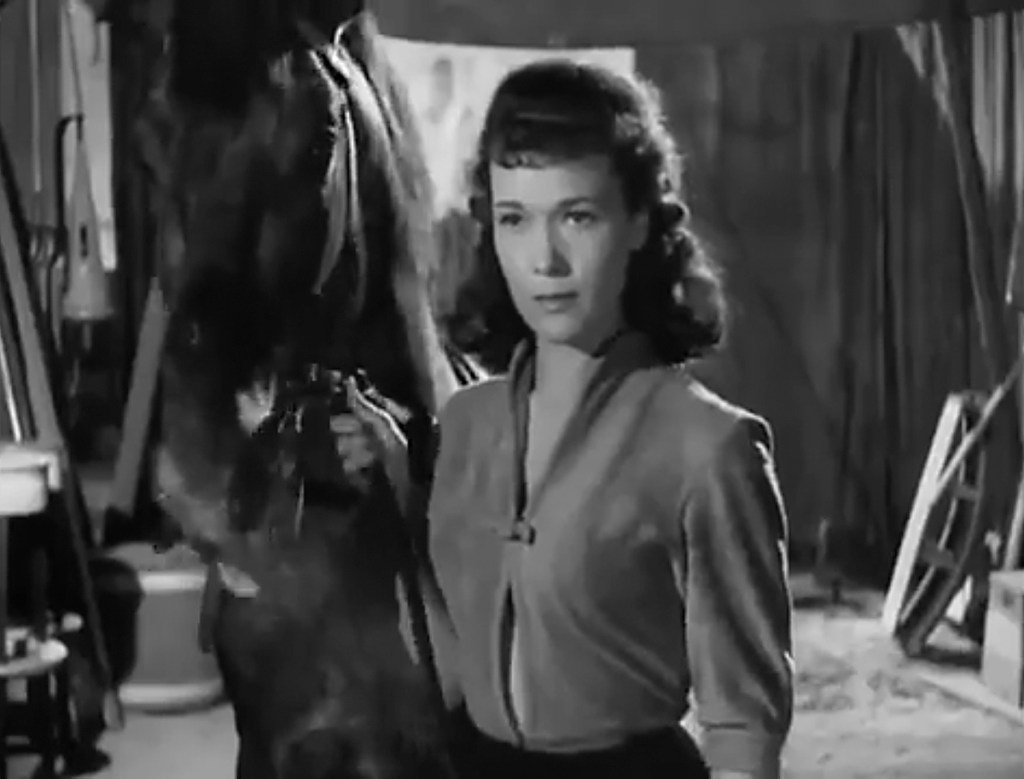
Romance and intrigue at the circus in this DEFA-in-name-only film from the fifties.
The circus film is a genre that doesn’t get much attention although it’s one of the oldest film genres. Studios started making them during the silent era (The Circus Man, Crown and Whip, and Circus Days) and the genre reached an apex during the first half of the fifties (The Road, Man on a Tightrope, and Trapeze), culminating in The Greatest Show on Earth winning the Academy Award for Best Picture of 1952.1 Some of the most famous directors in the world have explored the subject, including Charlie Chaplin (The Circus), Ingmar Bergman (Sawdust and Tinsel), and Federico Fellini (La Strada). While circus films still are made from time to time, they were never more popular than they were during the early fifties. Undoubtedly some of the enthusiasm for these films during this period came from post-war nostalgia for the “good old days.” Circus films were all over the place in the early fifties, so it’s no surprise that DEFA would join in on the fun.
Carola Lamberti (Carola Lamberti – Eine vom Zirkus) was released on December 9, 1954—a little over two weeks before the Dean Martin and Jerry Lewis comedy 3 Ring Circus came out, which effectively caped off the circus fad of the early fifties. Carola Lamberti (played by Henny Porten) is the owner of Circus Lamberti. Carola took over the circus after the death of her husband. Her sons, Pero, Camillo and Eduard perform together as the Three Lambertis, a trapeze act that is one of the two top draws for the circus. The other is Viola (Ursula Kempert), a woman who performs daring stunts on a horse. Carola doesn’t care much for Viola, who uses her sex appeal to get men to do what she wants. Pero Lamberti (Edwin Marian) is so in love with Viola that decides to slip away from minding the horses to join her in her caravan. When a lamp tips over and starts a fire in the horse trailer while he’s away, Carola kicks Pero and Viola out of the circus and attempts to replace Viola with Ines (Catja Gorna), the wife of Camillo (Horst Naumann). Ines is recovering from a foot injury and her attempt to perform Viola’s horseback stunts doesn’t end well. Carola herself attempts to go old school and demonstrate how well trained her horses are, but this is a modern crowd and dressage doesn’t impress them. Fortunately, Pero returns to the circus to save the day with the three-man trapeze act. Carola decides it’s time to retire and let her sons take over the circus. Unfortunately, this also means the return of Viola and soon she’s hopping in the sack with the middle brother Eduard (Rüdiger Renn) as well as Pero. Eduard isn’t lovestruck like Pero. He just wants to have fun, which suits Viola just fine. Camillo, the only married brother, is immune to Viola’s charms, so she surreptitiously uses the other two brothers to make things go her way. Soon things reach the breaking point, and it’s time for Carola to return and get things back on track.

Unlike many DEFA films, there is no obvious socialist message here beyond the obvious one that things work better when everyone works as a team. This may be partly due to the fact that it is, for all intents and purposes, a West German film that just happened to be made at DEFA. Normally, the DEFA films made by West German directors still required some recognition of socialist values, but because production on Carola Lamberti started shortly after the events of the East German uprising of 1953, the SED was anxious to demonstrate that artistic freedom was still alive and well in the GDR; a tactic they’d repeat in 1961 after building the Berlin Wall.
Hans Müller was a West German by birth. He made his first film for the Terra film company near the end of the War, and, in 1947, made Und finden dereinst wir uns wieder (And One Day We’ll Find Each Other Again) in his hometown of Lüdenscheid. After that, he bounced back and forth between DEFA in East Germany and various West German film companies until 1959, when he made Triplets on Board (Drillinge an Bord) for the West German film company Deutsche Film Hansa. It would turn out to be his last feature film. After that, he worked exclusively in West German television. He died in 1977.

Although nearly forgotten today, Henny Porten was one of the biggest stars in Germany during the silent era. She appeared in over 100 feature films and at least as many short films between 1906 and 1929. Born in Magdeburg in 1890, Henny was the daughter of Franz Porten, a former opera singer who became a film director in the early days of the medium. It was he who cast her in her first film, Meißner Porzellan (Meissen Porcelain), a short film that featured a script written by her older sister Rosa, who also appears in the film. Unlike some silent stars, she successfully made the transition from silent to sound with G.W. Pabst’s Skandal um Eva (Scandal About Eva). Unfortunately, she didn’t fare as well when the Nazis came to power. Her husband, William von Kaufman, was the son of Richard von Kaufmann, a noted Jewish economist and art collector, which made him a Mischling ersten Grades (First Degree Mixed Race). This meant he could still call himself a German, but wouldn’t get much respect. Porten continued to work, but her film roles were few and far between, even though she was added to Joseph Goebbels’ Gottbegnadeten-Liste, a list of artists who were deemed crucial to German culture. By the time she played Carola Lamberti, Henry Porten was past her prime and not finding much work in West Germany. Like many West Germany film talents, she turned to DEFA for work. She made one more film for DEFA—Das Fräulein von Scuderi, which, like Carola Lamberti, was directed by a West German—and that would be her last film. She retired after that and died in 1960.
As the dominatrix-like Viola, Ursula Kempert is excellent, but her career as an actress was sadly short-lived. This was the last of the three feature films she appeared in, and she has only one more appearance listed in IMDB, a 1955 TV movie titled Kaution (Bail Bond). The man she was married to had trouble with the authorities in East Germany, so the couple moved to Sweden. There, her husband was able to continue his career as a dentist, but Kempert’s career as an actress was over. After the Wende, the couple moved back to Germany but Kempert did not resume her acting career. Her husband died in 2004. Ms. Kempert continues to live in Mecklenburg-Vorpommern.
While this was Ursula Kempert’s last film, it was Rüdiger Renn’s first. He continued to make movies on both sides of the border until the Wall put an end to the easy movement between East and West Berlin. It was while working on Carola Lamberti that Renn met his future wife, Catja Görna. Görna started her film career in 1942 with Arthur Maria Rabenalt’s Meine Frau Teresa (My Wife Teresa). Right after the war, she appeared in Morituri, a film that is most famous today for being Klaus Kinski’s first film. That film was directed by Eugen York, who married Görna. It was while working on Carola Lamberti that Renn and Görna, who played a married couple in the film, fell in love. By the time the film was completed, Eugen York was out of the picture and Renn and Görna were an item. Like Ursula Kempert, Carola Lamberti was Görna’s last feature film. She appeared as Marianna in a West German television adaptation of William Shakespeare’s Measure for Measure, but moved into a career in dubbing after that, providing the German voices for such stars as Gina Lollobrigida and Loretta Young.

Playing Lamberti brothers Camillo and Pero were Horst Naumann and Edwin Marian respectively. Both men got their starts at DEFA and both men left the GDR before the Wall came down. Naumann left early, moving to West Germany in 1958. There he had a long career in television and movies. He is best known today for his recurring role as Doctor Schröder on Das Traumschiff (The Dream Ship), a German TV show along the lines of The Love Boat. Marian left East Germany in 1980 after facing several censorship issues over his films. He appeared in several West German television shows over the years, sometimes reappearing in different roles on the same TV show. He died in 2018.
Carola Lamberti did well at the box office, but met with indifference from the critics at the time. “We’ve seen this all before” was the most common complaint. Coming, as it did, at the very end of the circus fad, it didn’t garner much attention. It’s not a bad film, but its West German roots are showing. There is little about this film that says DEFA. It’s entertaining, but not exactly thought provoking. It’s well-filmed but director Müller’s heavy use of blur wipes and fads gives it a dated look, even for 1954. I doubt that this film will ever be available with English subtitles.
If you like what I do here and would like to let me know, you can buy me a cup of coffee by clicking on the button to the left.
1. A fact that is held up to this day as the perfect example of the Academy’s annual cluelessness when it comes to picking the year’s best movie.
© Jim Morton and East German Cinema Blog, 2022. Unauthorized use and/or duplication of this material without express and written permission from this site’s author and/or owner is strictly prohibited. Excerpts and links may be used, provided that full and clear credit is given to Jim Morton and East German Cinema Blog with appropriate and specific direction to the original content.

